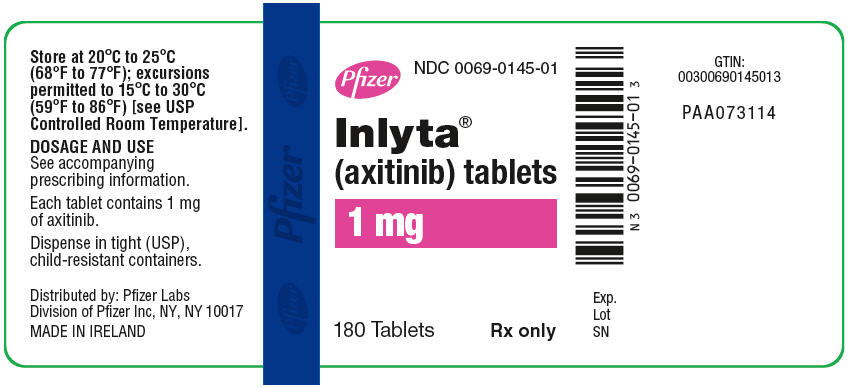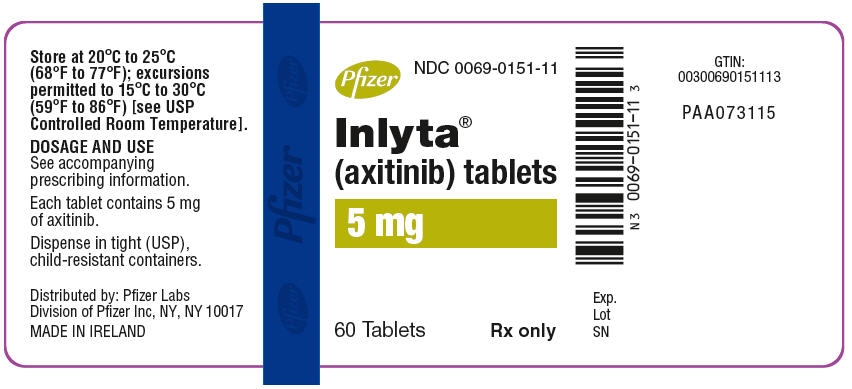Inlyta
Generic name: axitinib
Drug classes: Multikinase inhibitors, VEGF/VEGFR inhibitors
Medically reviewed by A Ras MD.
What is Inlyta?
Inlyta is a prescription medicine that is used to treat kidney cancer. Inlyta may be given to you for other reasons.
Description
INLYTA (axitinib) is a kinase inhibitor. Axitinib has the chemical name N-methyl-2-[3-((E)-2-pyridin-2-yl-vinyl)-1H-indazol-6-ylsulfanyl]-benzamide. The molecular formula is C22H18N4OS and the molecular weight is 386.47 Daltons. The chemical structure is:

Axitinib is a white to light-yellow powder with a pKa of 4.8. The solubility of axitinib in aqueous media over the range pH 1.1 to pH 7.8 is in excess of 0.2 µg/mL. The partition coefficient (n-octanol/water) is 3.5.
INLYTA is supplied as red, film-coated tablets containing either 1 mg or 5 mg of axitinib together with microcrystalline cellulose, lactose monohydrate, croscarmellose sodium, magnesium stearate, and Opadry® II red 32K15441 as inactive ingredients. The Opadry II red 32K15441 film coating contains lactose monohydrate, HPMC 2910/Hypromellose 15cP, titanium dioxide, triacetin (glycerol triacetate), and red iron oxide.
Mechanism of Action
Axitinib has been shown to inhibit receptor tyrosine kinases including vascular endothelial growth factor receptors (VEGFR)-1, VEGFR-2, and VEGFR-3 at therapeutic plasma concentrations. These receptors are implicated in pathologic angiogenesis, tumor growth, and cancer progression. VEGF-mediated endothelial cell proliferation and survival were inhibited by axitinib in vitro and in mouse models. Axitinib was shown to inhibit tumor growth and phosphorylation of VEGFR-2 in tumor xenograft mouse models.
Before taking Inlyta, tell your doctor:
- If you are allergic to Inlyta; any part of this medicine; or any other drugs, foods, or substances. Tell your doctor about the allergy and what signs you had.
- If you have high blood pressure.
- If you take any drugs (prescription or OTC, natural products, vitamins) that must not be taken with Inlyta, like certain drugs that are used for HIV, infections, or seizures. There are many drugs that must not be taken with Inlyta.
- If you are breast-feeding. Do not breast-feed while you take Inlyta and for 2 weeks after your last dose.
This is not a list of all drugs or health problems that interact with this medicine.
Tell your doctor and pharmacist about all of your drugs (prescription or OTC, natural products, vitamins) and health problems. You must check to make sure that it is safe for you to take Inlyta with all of your drugs and health problems. Do not start, stop, or change the dose of any drug without checking with your doctor.
What are some things I need to know or do while I take Inlyta?
- Tell all of your health care providers that you take Inlyta. This includes your doctors, nurses, pharmacists, and dentists.
- Constipation, diarrhea, throwing up, and upset stomach are common with Inlyta. If these happen, talk with your doctor about ways to lower these side effects. Call your doctor right away if any of these effects bother you, do not go away, or get very bad.
- A very bad and sometimes deadly brain problem called posterior reversible encephalopathy syndrome (PRES) has happened with Inlyta. Call your doctor right away if you have signs like feeling confused, lowered alertness, change in eyesight, loss of eyesight, seizures, or very bad headache.
- Very bad and sometimes deadly holes in the GI (gastrointestinal) tract or fistulas have happened with Inlyta. Talk with the doctor.
- Severe and sometimes deadly bleeding problems have happened with Inlyta.
- Blood clots have happened with Inlyta. Sometimes, these blood clots have been deadly. Call your doctor right away if you have chest, arm, back, neck, or jaw pain or pressure; coughing up blood; numbness or weakness on 1 side of your body, trouble speaking or thinking, change in balance, or change in eyesight; shortness of breath; or swelling, warmth, or pain in the leg or arm.
- High blood pressure has happened with Inlyta. Have your blood pressure checked as you have been told by your doctor.
- Have blood work checked as you have been told by the doctor. Talk with the doctor.
- Have your urine checked as you have been told by your doctor.
- Avoid grapefruit and grapefruit juice.
- Tell your doctor if you have signs of high or low blood sugar like breath that smells like fruit, dizziness, fast breathing, fast heartbeat, feeling confused, feeling sleepy, feeling weak, flushing, headache, more thirsty or hungry, passing urine more often, shaking, or sweating.
- This medicine may affect fertility. Fertility problems may lead to not being able to get pregnant or father a child.
- Men with a partner who may get pregnant must use birth control while taking Inlyta and for some time after the last dose. Ask your doctor how long to use birth control. If your partner gets pregnant, call the doctor right away.
- This medicine may cause harm to an unborn baby. A pregnancy test will be done before you start Inlyta to show that you are NOT pregnant.
- Women must use birth control while taking Inlyta and for some time after the last dose. Ask your doctor how long to use birth control. If you get pregnant, call your doctor right away.
How is Inlyta best taken?
Use Inlyta as ordered by your doctor. Read all information given to you. Follow all instructions closely.
- Take with or without food.
- Swallow whole with a full glass of water.
- If you throw up after taking a dose, do not repeat the dose. Take your next dose at your normal time.
- Keep taking Inlyta as you have been told by your doctor or other health care provider, even if you feel well.
- This medicine may affect how wounds heal. If you have surgery, you may need to stop Inlyta before surgery. Start taking it again after surgery as you are told by your doctor.
What do I do if I miss a dose?
- Skip the missed dose and go back to your normal time.
- Do not take 2 doses at the same time or extra doses.
What are the side effects of Inlyta that I need to call my doctor about immediately?
WARNING/CAUTION: Even though it may be rare, some people may have very bad and sometimes deadly side effects when taking a drug. Tell your doctor or get medical help right away if you have any of the following signs or symptoms that may be related to a very bad side effect:
- Signs of an allergic reaction, like rash; hives; itching; red, swollen, blistered, or peeling skin with or without fever; wheezing; tightness in the chest or throat; trouble breathing, swallowing, or talking; unusual hoarseness; or swelling of the mouth, face, lips, tongue, or throat.
- Signs of bleeding like throwing up or coughing up blood; vomit that looks like coffee grounds; blood in the urine; black, red, or tarry stools; bleeding from the gums; abnormal vaginal bleeding; bruises without a cause or that get bigger; or bleeding you cannot stop.
- Signs of high blood pressure like very bad headache or dizziness, passing out, or change in eyesight.
- Signs of thyroid problems like change in weight; feeling nervous, excitable, restless, or weak; hair thinning; depression; neck swelling; not able to focus; trouble with heat or cold; menstrual changes; shakiness; or sweating.
- Signs of fluid and electrolyte problems like mood changes, confusion, muscle pain or weakness, a heartbeat that does not feel normal, very bad dizziness or passing out, fast heartbeat, more thirst, seizures, feeling very tired or weak, not hungry, unable to pass urine or change in the amount of urine produced, dry mouth, dry eyes, or very bad upset stomach or throwing up.
- Skin wound that will not heal.
- Very bad belly pain.
- Feeling very tired or weak.
- Redness or irritation of the palms of hands or soles of feet.
- Change in voice.
- Fever or chills.
- Sore throat.
- Heart failure has rarely happened in people taking Inlyta. Sometimes, this has been deadly. Call your doctor right away if you have shortness of breath, a big weight gain, or swelling in the arms or legs.
What are some other side effects of Inlyta?
All drugs may cause side effects. However, many people have no side effects or only have minor side effects. Call your doctor or get medical help if any of these side effects or any other side effects bother you or do not go away:
- Stomach pain or heartburn.
- Change in taste.
- Feeling tired or weak.
- Headache.
- Weight loss.
- Not hungry.
- Mouth irritation or mouth sores.
- Muscle or joint pain.
- Dry skin.
- Cough.
- Pain in arms or legs.
- Dizziness.
These are not all of the side effects that may occur. If you have questions about side effects, call your doctor. Call your doctor for medical advice about side effects.
You may report side effects to the FDA at 1-800-332-1088. You may also report side effects at https://www.fda.gov/medwatch.
If overdose is suspected:
If you think there has been an overdose, call your poison control center or get medical care right away. Be ready to tell or show what was taken, how much, and when it happened.
How do I store and/or throw out Inlyta?
- Store at room temperature.
- Store in a dry place. Do not store in a bathroom.
- Keep all drugs in a safe place. Keep all drugs out of the reach of children and pets.
- Throw away unused or expired drugs. Do not flush down a toilet or pour down a drain unless you are told to do so. Check with your pharmacist if you have questions about the best way to throw out drugs. There may be drug take-back programs in your area.
Label
PRINCIPAL DISPLAY PANEL – 1 MG TABLET BOTTLE LABEL
- Pfizer
- NDC 0069-0145-01
- Inlyta®
(axitinib) tablets - 1 mg
- 180 Tablets
- Rx only

![]()
PRINCIPAL DISPLAY PANEL – 5 MG TABLET BOTTLE LABEL

